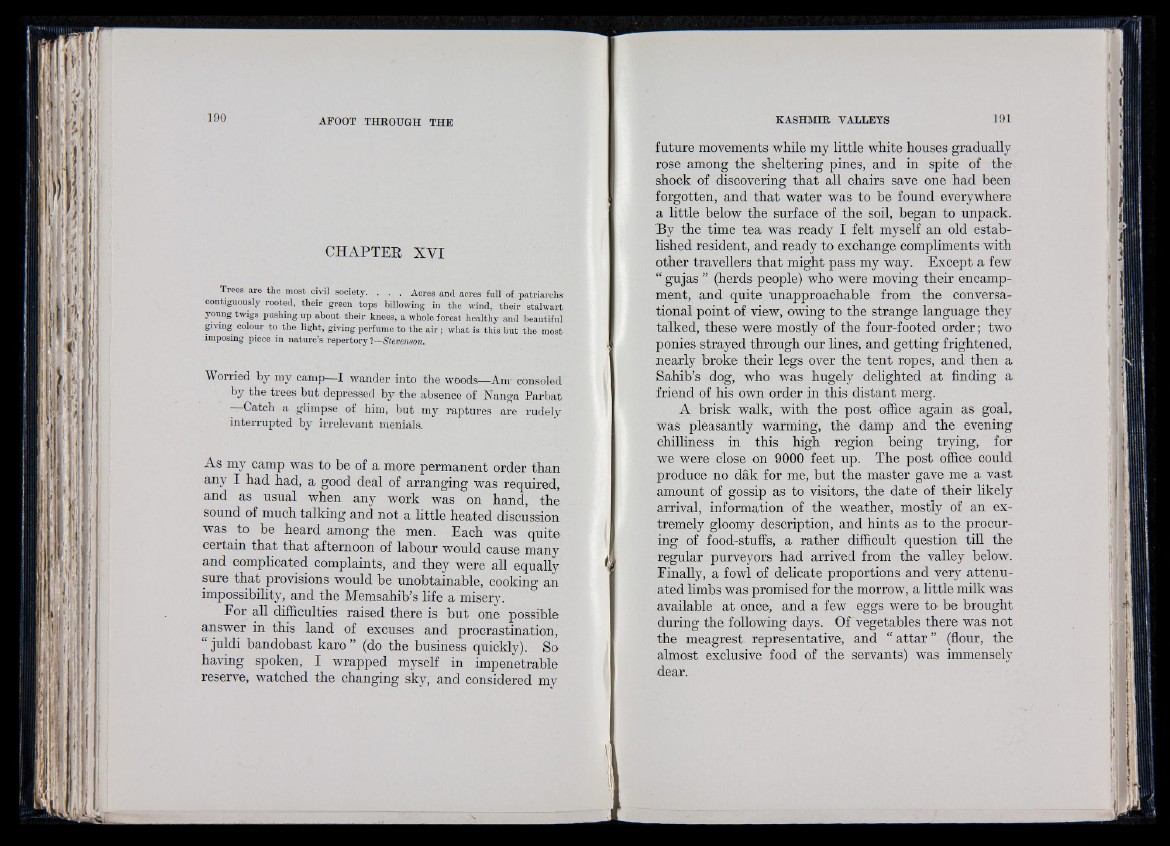
CHAPTER XVI
Trees are the most civil society. . . . Acres and acres full of patriarchs
contiguously rooted, their green tops billowing in the wind, their stalwart
young twigs pushing up about their knees, a whole forest healthy and beautiful
giving colour to the light, giving perfume to the a i r ; what is this but the most
imposing piece in nature’s repertory ?—Stevenson.
Worried by my camp—I wander into the woods—Am- consoled
by the trees b ut depressed by th e absence of Nanga Parba t
—Catch a -glimpse of him, b ut my raptures are rudely
interrupted by irrelevant menials.
As my camp was to be of a more permanent order than
any I had had, a good deal of arranging was required,
and as usual when any work was on hand, the
sound of much talking and not a little heated discussion
was to be heard among the men. Each was quite
certain that that afternoon of labour would cause many
and complicated complaints, and they were all equally
sure that provisions would be unobtainable, cooking an
impossibility, and the Memsahib’s life a misery.
For all difficulties raised there is but one possible
answer in this land of excuses and procrastination,
“ juldi bandobast karo ” (do the business quickly). So
having spoken, I wrapped myself in impenetrable
reserve, watched the changing sky, and considered my
future movements while my little white houses gradually
rose among the sheltering pines, and in spite of the
shock of discovering that all chairs save one had been
forgotten, and that water was to be found everywhere
a little below the surface of the soil, began to unpack.
By the time tea was ready I felt myself an old established
resident, and ready to exchange compliments with
other travellers that might pass my way. Except a few
“ gujas ” (herds people) who were moving their encampment,
and quite unapproachable from the conversational
point of view, owing to the strange language they
talked, these were mostly of the four-footed order; two
ponies strayed through our lines, and getting frightened,
nearly broke their legs over the tent ropes, and then a
Sahib’s dog, who was hugely delighted at finding a
friend of his own order in this distant merg.
A brisk walk, with the post office again as goal,
was pleasantly warming, the damp and the evening
chilliness in this high region being trying, for
we were close on 9000 feet up. The post office could
produce no dak for me, but the master gave me a vast
amount of gossip as to visitors, the date of their likely
arrival, information of the weather, mostly of an extremely
gloomy description, and hints as to the procuring
of food-stuffs, a rather difficult question till the
regular purveyors had arrived from the valley below.
Finally, a fowl of delicate proportions and very attenuated
limbs was promised for the morrow, a little milk was
available at once, and a few eggs were to be brought
during the following days. Of vegetables there was not
the meagrest representative, and “ attar ” (flour, the
almost exclusive food of the servants) was immensely
dear.